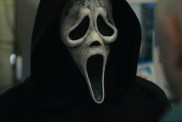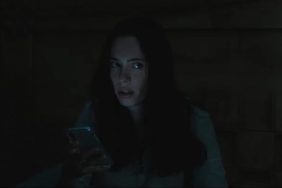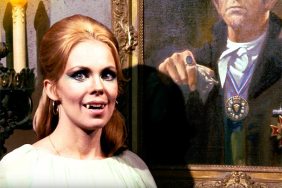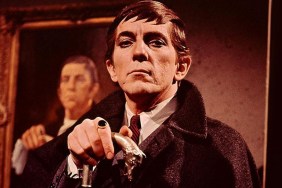
Sound SHOCK looks at the music of Robert Cobert from Dan Curtis’ DARK SHADOWS features.
When one thinks of famous filmmakers and their right-hand music men, names like Leone and Morricone, Spielberg and Williams and Burton and Elfman come to mind.
For a handful of us, a sound/image marriage of equal heft comes in the form of Dan Curtis and Robert Cobert.
Curtis is, as most of you reading these words right now know, one of the founding architects of filmed Gothic horror, serving as the creator and producer of influential ’60s ABC daytime supernatural soap opera DARK SHADOWS, as well as subsequent small-screen shockers like THE NIGHT STALKER (both the TV film and series), DRACULA, DEAD OF NIGHT, THE NORLISS TAPES and many, many more. And for virtually every one of his works, he employed composer Cobert. And together, they made history.
But Curtis’ mark wasn’t relegated exclusively to television. One might cite his horrifying 1976 haunted house epic BURNT OFFERINGS as the best of his theatrically released horror product and certainly, that atmospheric Oliver Reed/Karen Black/Bette Davis-starring film is worthy of the word “masterpiece”. Cobert’s music for it is fantastic too.
But as far as key moments in the Curtis/Cobert collaboration canon are concerned, the double-stab at adapting the world of DARK SHADOWS stand as high points of both artist’s genre achievements.
In 1996, Rhino Movie Music and Turner Classic Movies released a beautiful CD that collected the complete soundtracks of both Curtis’ 1970 film HOUSE OF DARK SHADOWS and its companion effort, 1971’s NIGHT OF DARK SHADOWS; a now out of print release that is an essential DS collectible as well as a remarkably eerie, beautiful soundscape in and of itself.
Now, Cobert’s HOUSE OF DARK SHADOWS score was not exactly what one would call original. The film was a condensed and altered account of the resurrection of vampire Barnabas Collins (Jonathan Frid) and his reign of terror in his native home of Collinsport and it was, for a studio production, a relatively low budget effort. Still, almost all of the original series’ cast returned and the quality of the film was opulent and considerably more graphic, with jarring Dick Smith bloodletting and make-up FX and a disturbing streak of nihilism. It’s not just a great DARK SHADOWS film, it’s a magnificent Gothic vampire film full stop. But one of the ways in which the savvy and penny-pinching conscious Curtis allowed that visual value to thrive, was to dial back costs on the music. So, the sounds of HOUSE are, while all Cobert orchestrations, primarily recycled from other sources, chiefly from Curtis pre-DS TV movie THE STRANGE CASE OF DR. JEKYLL AND MR. HYDE, a film that was not exactly a ratings winner and featured some of Cobert’s must luscious compositions; here, many of those cues run long and are accentuated by new Cobert music to flesh them out and tie them directly into the DS mythos. Additionally, key themes from the TV show are present as well, including the haunting “Josette’s Music Box” and “Josette’s Theme”, as well as the now iconic, theremin heavy DARK SHADOWS opening main title itself.
The soundtrack CD presents all 31 cues in their entirety, even leaving in sound FX like the screeching bat from the film’s final frame. Additionally, some of Cobert’s rock and roll sounds are featured in the bonus track “David’s Radio”.
As classic and effective as the music used for HOUSE OF DARK SHADOWS is, however, it pales in comparison to Cobert’s score for NIGHT OF DARK SHADOWS.
HOUSE did alarmingly well, both domestically and internationally, so much so that MGM rushed what was designed as a sequel, into production. Giving Curtis and company a considerably heftier budget to play with, Curtis commissioned Cobert to write a primarily original score, with only a handful of cues recycled from the series and a few once more cribbed from DR. JEKYLL. The film was originally supposed to be a continuation of the Barnabas Collins story, but when Frid balked at being typecast, Curtis cobbled together a new story that took place in an alternate timeline in Collinsport (like the series would so often do) and focused its narrative on Quentin Collins (David Selby) and the witch-ghost Angelique (Lara Parker).
NIGHT is a masterpiece of mood and tone and feels totally fresh, totally free of the shackles of the series. Unfortunately, MGM hacked more than half an hour off the running time a mere week before release, making the film far more impressionistic than originally intended. Critics weren’t kind, audiences were confused and the film fare poorly.
But it’s a mesmerizing Gothic mystery/romance, even in its cut form, its power relying strongly on the haunting music of Robert Cobert.
Introducing the film is one of Cobert’s most beautiful compositions, the delicate “Love Theme from Dark Shadows”, a track that fleshes out a forgotten piece from the series and adds guitar and, most importantly, a mournful harmonica sound, that runs throughout the film’s running time. It’s reminiscent somewhat of John Barry’s music from MIDNIGHT COWBOY…
The classic “Quentin’s Theme” is re-invented in several key ways, most effectively in the phantasmagorical “The Taking of Angelique”. The chilling “Terror at the Pool House” is another key track that works just as well without the images of a floating Angelique as it does with it.
Like with its predecessor, the CD contains every cue used in NIGHT OF DARK SHADOWS and also throws in a gorgeous acoustic guitar rendition of the theme, one that is actually not even in the film at all.
As we’ve cited, this release is a magnificent aural love-letter to Cobert’s music and Curtis’ vision (not to mention the latter’s sharp sense of recycling) and is now unfortunately out of print. Presumably, it can be found online in some sort of streaming format, but, if you’re a fan, you owe it to yourself to find a hard copy (try Amazon, though it sure aint cheap) as the packaging is pretty and there’s a rather stunning 28-page, illustrated book inside as well.
And in case you haven’t seen the films themselves, both HOUSE and NIGHT are available on Blu-ray now from Warner Home Video.
House/Night of Dark Shadows
-
House/Night of Dark Shadows #1

-
House/Night of Dark Shadows #2

-
House/Night of Dark Shadows #3

-
House/Night of Dark Shadows #4

-
House/Night of Dark Shadows #5

-
House/Night of Dark Shadows #6

-
House/Night of Dark Shadows #7










